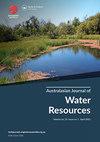在对墨累-达令盆地计划的审查中,如何提高对可持续导流限制不确定性的管理?
IF 2.2
Q2 WATER RESOURCES
引用次数: 1
摘要
本文章由计算机程序翻译,如有差异,请以英文原文为准。
How can management of uncertainty in sustainable diversion limits be advanced in the review of the Murray-Darling Basin Plan?
ABSTRACT This paper explores how scientific uncertainty was addressed in the Australian Government’s decision-making process leading to the establishment of the ‘sustainable diversion limit’ (SDL) for the Murray-Darling Basin Plan in 2012. Our research draws on a systematic document analysis to generate an argument map representing the reasoning presented in government reports and legislation, as well as interviews with current and former public servants and researchers who have knowledge of the decision-making process. Looking towards the review of the Basin Plan, this analysis provides additional evidence for a number of areas to be discussed to advance the management of uncertainty in the associated decision-making. First, there is a need to address the challenges to adaptive management, as adaptive management delegates much of the uncertainty to future changes in policy as improved knowledge is gained. Second, there is a need to generate and use new knowledge for the review since the legislative mandate to use the ‘best available science’ enabled the use of pre-existing models and historical climate data. Third, there is a need for dialogue on handling of trade-offs between objectives given that uncertainty creates space for political pressures from interest groups. Fourth, there should be wider transparency about uncertainty in decision-making processes.
求助全文
通过发布文献求助,成功后即可免费获取论文全文。
去求助
来源期刊

Australasian Journal of Water Resources
WATER RESOURCES-
CiteScore
5.10
自引率
21.90%
发文量
25
期刊介绍:
The Australasian Journal of Water Resources ( AJWR) is a multi-disciplinary regional journal dedicated to scholarship, professional practice and discussion on water resources planning, management and policy. Its primary geographic focus is on Australia, New Zealand and the Pacific Islands. Papers from outside this region will also be welcomed if they contribute to an understanding of water resources issues in the region. Such contributions could be due to innovations applicable to the Australasian water community, or where clear linkages between studies in other parts of the world are linked to important issues or water planning, management, development and policy challenges in Australasia. These could include papers on global issues where Australasian impacts are clearly identified.
 求助内容:
求助内容: 应助结果提醒方式:
应助结果提醒方式:


